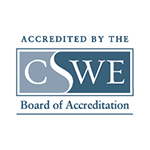100% Online Master of Social Work (MSW)
Become an Agent of Hope
Career-Focused. Student-Centered. Success-Oriented.
At King University, you join more than a Master of Social Work (MSW) program. You join like-minded, passionate professionals who are deeply dedicated to being change agents for oppressed individuals, families, communities, and organizations.
Enroll in an online, CSWE-accredited, MSW program that empowers you to do more with its Clinical Advocacy focus. You’ll learn how to identify community resources and service gaps, and develop realistic plans to obtain essential resources, revise existing programs, and create new ones. You graduate knowing how to bring lasting hope and help to the clients and communities you serve.
If you have a BSW from a CSWE-accredited program, the Advanced Standing program will save you time and money in earning your MSW degree. You can complete the program with 30-33 credits in 12 months.
In your quest to serve as a clinical social worker, you’ll be guided by faculty who offer you their rich experiences in ethically integrating the ideals of a Christian faith into practice.
Our unwavering commitment to our students means that you’ll receive the education you need for meaningful professional and personal growth through a relevant and industry-specific course of study. Discover today why King University has the difference you need to advance your career.
100% Online
Affordable Tuition
CSWE-Accredited
Request More Information
Fill out the form to start your King journey today.
Note: All fields required.
A Curriculum to Strengthen Communities
Our MSW curriculum was designed to align with CSWE accreditation standards. The Foundation program consists of 57-60 credits and 1000 hours of fieldwork that can be completed within 22 months, or you may take up to 48 months to complete the program if necessary. The Advanced Standing program, launching in the Summer of 2022, consists of 30-33 credits and 500 hours of fieldwork. It can be completed within 12 months, but you can take as many as 24 months to complete the program.
In your quest to serve as a clinical social worker, you’ll be guided by faculty who offer you their rich experiences in ethically integrating the ideals of a Christian faith into practice.
Courses you may take in this program include:
This course provides conceptual frameworks for understanding the role and role strains of professional social workers in organizational settings and expands your capacity to maximize your practice effectiveness in and through organizations, provide organizational leadership, contribute to constructive organizational change and professionally survive the rigors of organizational processes and politics. The course examines organizational goals, structures, environments, and processes that impact service strategies, case decisions, and the achievement of professional objectives.
This course provides advanced practice knowledge and skills in preparation for social work practice involving individuals with or at risk of developing substance abuse-related problems. The course covers principles, instruments, and practice skills in evidence-informed assessment and diagnosis, treatment planning and implementation, intervention, relapse prevention, and legal/ethical issues related to intervening around substance abuse problems. You are expected to learn to evaluate the pharmacological mechanisms of dependence, components of addiction-related behavioral change, and issues involved in prevention, intervention, and evaluation of substance abuse and addiction. The course also examines the impact of age, race, gender, social class, culture, ethnicity, spirituality, religion, sexual orientation, national origin, and physical and mental ability on patterns of addiction.
This course examines the social and human service environments of geographical areas in the United States that are recognized as underserved and under-resourced with respect to social welfare service delivery. Beyond the exploration of salient social, political and economic dynamics, it also emphasizes knowledge and skill development for professional social work practice in such areas. This course focuses on working with clients and caregivers in building and strengthening social networks with special attention to congregations and religiously affiliated organizations as potential agents of community change.
This course emphasizes and provides knowledge and skill development for advanced interpersonal interventions with individuals within the context of families and family dynamics. It focuses on skills for (1) developing therapeutic alliances; (2) conducting theory-informed assessments; (3) developing mutually agreed upon intervention plans; (4) conducting evidence-based and theory-informed interventions; and (5) evaluating the individual’s and/or family’s progress and intervention effectiveness. It provides frameworks and skill development for individual and family-wide interventions by emphasizing multimodal integrated approaches to working with individuals in family contexts (e.g., Behavioral and Cognitive-Behavioral Family Therapy, Solution-Focused Family Therapy and Network Therapy) with diverse clientele experiencing crises for whom a variety of formal and informal helping networks are potentially available.
CSWE-Accredited Program
King University’s MSW program is accredited by the Council on Social Work Education’s (CSWE) Board of Accreditation (BOA). Accreditation of a baccalaureate or master’s social work program by the BOA indicates that it meets or exceeds standards of program quality evaluated through a peer review accreditation process. An accredited program has sufficient resources to meet its mission and goals and the BOA has verified that it demonstrates compliance with all sections of the Educational Policy and Accreditation Standards (EPAS). Accreditation applies to all program options, which includes locations and delivery methods. Accreditation provides reasonable assurance about the quality of the program and the competence of students graduating from the program. Review our program’s accredited status in CSWE’s Directory of Accredited Programs. For more information about social work accreditation, contact CSWE’s Department of Social Work Accreditation.

The Benefits of Online Learning
Learning in an online format provides the opportunity to adjust your academic path based on your personal preferences. You’ll have the chance to spend as much time with instructional materials as you need. King University’s online programs offer the same course of study and level of academic rigor as our on-campus counterparts. You’ll have access to the same experienced faculty and faith-based learning environment, and connect with your peers in a caring community atmosphere.
Request InfoBuild a Career Helping Others Build Better Lives
Our online Master of Social Work degree prepares you to work directly with clients as a clinical social worker. Your training at King empowers you to work in communities and organizations to bring about long-standing change. Overall employment of social workers is projected to grow 12 percent from 2020 to 2030, faster than the average for all occupations. About 78,300 openings for social workers are projected each year, on average, over the decade.1
Career Titles Include:
- Behavior Health Director
- Mental Health Program Manager
- Counselor
- Outreach Coordinator
Settings and Fields of Practice for MSW Graduates Include:
- Administration and Management Settings
- Mental Health and Substance Abuse settings
- Medical settings
- Child and Family settings
- Faith-based social service agencies
- Aging
- Corrections
- Research
Who We Are
King University is a Presbyterian-affiliated, doctoral-level comprehensive university dedicated to the integration of rigorous academic programming and the exploration of faith. For more than 150 years, we have offered students the opportunity to excel as thoughtful, resourceful, and responsible citizens with a passion for serving the world.
Source:
- “Social Workers,” Occupational Outlook Handbook, Bureau of Labor Statistics, U.S. Department of Labor. Retrieved on March 2022, from https://www.bls.gov/.
